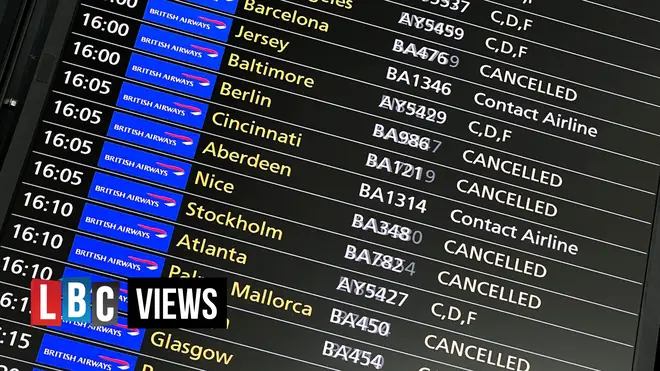
Iain Dale 7pm - 10pm
30 August 2023, 16:18 | Updated: 30 August 2023, 16:26

Paul recently retired as Chief Executive of the Gulf Air Group based in Bahrain. During his career he has been CEO in charge of a number of UK airports
On Monday, news channels were reporting the closure of UK Airspace because of a system failure at the UK’s National Air Traffic Service control center at Swanwick.
Although the media were suggesting a 911-style shutdown of the aviation system, a quick check on Flightradar24 revealed that flights were still operating.
This isn’t the first time that technical issues have impacted the air traffic system but in the current reporting climate, that message was amplified to make it very newsworthy.
What precisely happened remains a technical mystery to the travelling public and even to someone like me with a modicum of understanding of the system, albeit an analogue rather than digital one.
We were told that the apparent cause was the entry of incorrect flight data which spooked the system and quite rightly precautions were taken to minimise the downside risk.
When I was a military air traffic controller, some years ago, the systems were analogue - a cathode ray tube, a flight progress strip, a chinagraph pencil and a good brain were the key tools to help manage the job.
Even then, in the 1980’s, the UK was the keystone of the European Air traffic system and a glitch here would have ramifications across Europe and the North Atlantic.
Move forward 40 years and the technology has eclipsed those basic tools and the traffic demand is even greater but the UK remains that keystone and it must manage now in a more complex environment.
The impact of the anomaly meant that a quarter of the flights on that day were cancelled.
With fewer slots available, aircraft were diverted, and crews ran out of duty hours; the net result, in the eyes of the consumer, was chaos.
And why wouldn’t it be? Away from home without your normal support to be told you are on your own is just awful.
The key challenge is the flow of information. For the service provider - they want to contain the situation; for the consumer - they can never have enough information and they want it regularly and they also want the ability to complain to someone.
However, losing control of the narrative and being too slow to react creates even more problems.
After the initial system shock comes the reset; this usually can be fixed quickly but the knock-on effects can take days to recover.
What to do?
The first rule must be to take control of the narrative and minimise the fallout.
It took NATS all day to get the narrative right but by then it was too late. A few airlines acted very quickly and apologised for the cancellations and delays – for example, Ryanair, had their CEO out “on internet parade” informing customers of what went wrong and what would happen next.
However, it wasn’t the industry’s finest hour or day.
Managing the containment, as always, in these situations is the key and the best way to fix it is to contain the problem.
The airline operator will try to ringfence the issue so that even more new passengers aren’t impacted.
Given that airlines typically operate at 85 to 90% flight occupancy, there won’t be many seats nor spare aircraft available to pick up those who have been affected.
This week the matter is likely to be extreme as airlines try to repatriate some 250,000 passengers out of the million plus that should have flown that day.
It will bring no comfort to those who have been delayed but it seems a rogue piece of data caused a safety-conscious organisation to make the right decision and place flow controls on their customers - the airlines – who are also NATS’ principal owners.
However, the information stream could have been better managed and, more importantly, by acting quickly with timely and fulsome information about the event, what to do next and what compensation they could claim could have made this a less dramatic news story than it was.